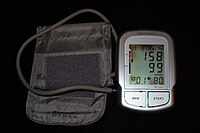
Photo from wikipedia
Simple Summary The severity of hypertension is correlated with cognitive dysfunction. Nutritional factors have a major contribution to the state of health. This study proposed to evaluate nutrition and lifestyle… Click to show full abstract
Simple Summary The severity of hypertension is correlated with cognitive dysfunction. Nutritional factors have a major contribution to the state of health. This study proposed to evaluate nutrition and lifestyle habits in hypertensive patients with/without cognitive dysfunction and to establish correlations to laboratory parameters. Our results showed a high incidence of diabetes mellitus and glucose intolerance as a comorbidity in our subjects, with zinc deficiency found in 74% of the subjects. Microalbuminuria was significantly higher in the subgroup with cognitive dysfunction. The daily intake of magnesium and cholesterol was significantly lower in patients with cognitive dysfunction compared to patients without cognitive dysfunction. The incidence of high body weight and obesity was high in the studied groups. Data provided by our research can contribute to the better management of hypertensive patients, revealing improper dietary habits, deficiencies and cardiovascular risk factors. Abstract (1) Background: Cognitive dysfunction is a major concern in hypertensive patients. Lifestyle habits and nutrition influence laboratory parameters, with an impact on clinical course. The objective of the study was to evaluate nutrition and lifestyle habits in hypertensive patients with/without cognitive dysfunction and establish correlations to laboratory parameters. Material and Methods: 50 patients admitted to the Cardiovascular Rehabilitation Clinic in Târgu Mureș were enrolled in this study between March–June 2021. We evaluated their cognitive function, and they filled in a questionnaire about lifestyle and nutrition. Biochemical blood tests were performed using a Konelab Prime 60i analyzer. IBM-SPSS22 and GraphPad InStat3 were used for statistics. Results: Mean age of hypertensive patients (n = 50) was 70.42 ± 4.82 (SD) years, half of them had cognitive dysfunction. Zinc deficiency was present in 74% of the subjects. The subgroup with cognitive dysfunction had significantly higher BMI (p = 0.009) and microalbuminuria (p = 0.0479), as well as significantly lower magnesium intake (p = 0.032) and cholesterol intake (p = 0.022), compared to those with normal cognitive status. Conclusions: Nutrition is in a close relationship with laboratory parameters; significant differences (microalbuminuria, cholesterol intake, BMI, etc.) are present between hypertensive patients with/without cognitive dysfunction. A healthy diet is important for the maintenance of metabolic balance, the achievement of optimal body weight, and the prevention of complications.
Journal Title: Life
Year Published: 2023
Link to full text (if available)
Share on Social Media: Sign Up to like & get
recommendations!